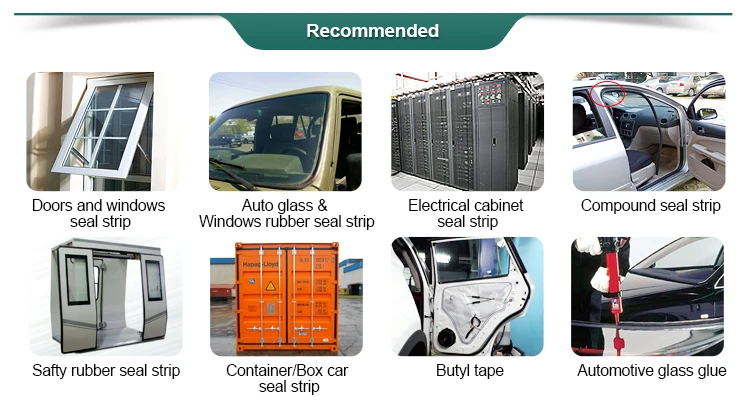CE Certification for Sponge Door Seals Ensuring Quality and Compliance in Manufacturing
okt . 22, 2024 11:21 Back to list
CE Certification for Sponge Door Seals Ensuring Quality and Compliance in Manufacturing
Understanding CE Certification for Sponge Door Seals
In today's global marketplace, product safety and compliance are paramount. For manufacturers and exporters targeting the European Union (EU), CE certification represents a critical standard that ensures products meet stringent safety, health, and environmental requirements. One significant product that requires such certification is the sponge door seal, widely used in various sectors, including construction, automotive, and manufacturing.
What is CE Certification?
CE marking is a certification mark that indicates a product's compliance with EU legislation. It is mandatory for products that fall within certain directives, such as the Construction Products Regulation (CPR) and the Low Voltage Directive (LVD). To obtain CE certification, products must undergo rigorous testing to verify that they meet the essential requirements outlined in relevant EU directives.
For sponge door seals, the CE mark signifies that the product adheres to health and safety standards, thus assuring consumers and clients of its reliability and quality. These seals play a crucial role in energy efficiency, noise reduction, and enhancing the overall integrity of buildings and vehicles.
Importance of Sponge Door Seals
Sponge door seals are designed to prevent air, noise, and water infiltration, making them essential for maintaining optimal indoor conditions. Whether in residential properties, commercial establishments, or vehicles, these seals contribute to energy efficiency by minimizing heat loss and preventing drafts. The reduction of noise pollution is another critical benefit, particularly in urban settings where sound insulation is crucial for comfort.
In the automotive industry, sponge door seals are vital for ensuring passenger comfort. They help in reducing wind noise and vibrations, enhancing the overall driving experience. Additionally, effective seals can play a significant role in increasing the longevity of vehicles by protecting against humidity and potential rust.
The Process of CE Certification for Sponge Door Seals
1. Identify Applicable Directives Manufacturers must first ascertain which directives apply to their sponge door seals. Key directives include the General Product Safety Directive and specific directives related to construction products and mechanical components.
ce cetification sponge door seal

2. Testing and Compliance Once the relevant directives are identified, the product must undergo various tests to ensure compliance. This includes evaluating the materials used in the making of the sponge door seals. The materials must be durable, resistant to environmental factors, and free from harmful substances.
3. Technical Documentation Manufacturers are required to compile technical documentation demonstrating the seal's compliance with the applicable EU standards. This may include test reports, quality assurance procedures, and descriptions of the manufacturing process.
4. Certification by Notified Bodies For certain products, especially those that might pose a higher risk, third-party certification from a Notified Body (an organization designated by EU countries) is necessary. These bodies conduct compliance assessments before granting CE certification.
5. Affixing the CE Mark Once all requirements are met, the CE mark can be affixed to the product, indicating that it complies with EU regulations. The manufacturer may then sell the certified sponge door seals across EU member states, enjoying a competitive advantage in the market.
Challenges and Considerations
While CE certification is essential, the process can be complex and daunting for manufacturers, especially those new to the EU market. Regulatory changes and differing requirements across member states can lead to confusion. Therefore, it is often beneficial for manufacturers to work with consultants or legal experts specializing in EU compliance.
Additionally, ongoing compliance must be maintained. Manufacturers should regularly review and update their processes to ensure continued adherence to evolving standards and regulations. This proactive approach not only safeguards against potential legal issues but also fosters trust and credibility with customers.
Conclusion
CE certification for sponge door seals is not merely a bureaucratic requirement; it is a testament to the product's quality and safety. By understanding the CE certification process, manufacturers can enhance their marketability, ensure customer satisfaction, and contribute to safer living and working environments. As the demand for high-quality, compliant products continues to rise, investing in proper certifications will undoubtedly pay off in the long run. This commitment to quality and compliance not only benefits manufacturers but also safeguards end-users, creating a win-win situation in the global market.
-
Replacement Filter Screen for Karcher SE3001 SE2001 Vacuum
NewsAug.04,2025
-
Karcher A2004 Vacuum Cartridge Filter Replacement - Durable & Efficient
NewsAug.03,2025
-
Karcher WD/MV HEPA Cartridge Filters | Dust Control Experts
NewsAug.02,2025
-
Top Window Seal Strip Adhesive Companies | Strong Weatherproofing
NewsAug.01,2025
-
Premium Oil Filter for Can-Am Outlander 2003-2017 420256188
NewsJul.31,2025
-
Hightech Injection LED Module size6414: Premium LED Lighting
NewsJul.31,2025
